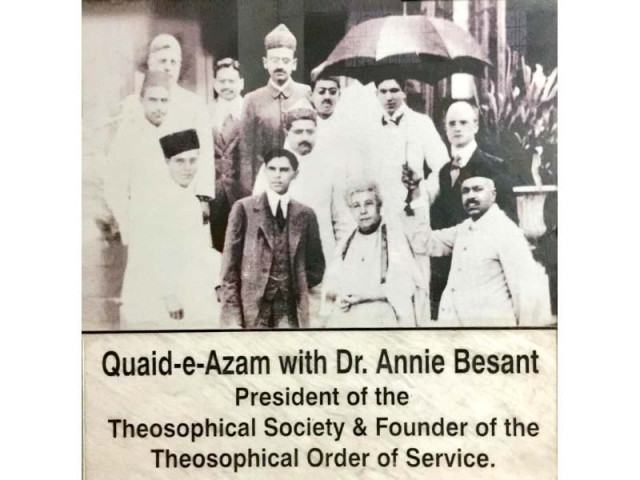Dr Annie Besant: A theosophical beacon who transformed Karachi
She was a free-thinking radical, a feminist, an anti-imperialist and author of over 300 books and pamphlets

Besant was a free-thinking radical, a feminist, an anti-imperialist, president of the Indian National Congress, a Fabian socialist and the author of over 300 books and pamphlets. She was also a close friend and mentor of Karachi's first mayor, Jamshed Nusserwanjee, a fellow theosophist.
Empowering women through skills in the age of automation
But what is theosophy? It is a philosophy that encourages oneness and universality, without distinction of race, creed, or sex. Theosophy also encourages the study of comparative religion, philosophy and science.
The emphasis of the KTS is on its social services wing, known as the Theosophical Order of Service (TOS), which provides low-cost education and scholarships to the underprivileged and was founded by Besant in 1908.
In the region that currently encompasses Pakistan, she also founded the Hyderabad chapter of the Society, known as Besant Lodge. The society had centres in Lahore and Quetta too, but these subsequently shut down.
Historian Dr Mubarak Ali, a keynote speaker at the event, described Besant as a product of a period that witnessed the birth of new ideas in England, then at its peak as a colonial power. In the 1870s, she became friends with Charles Bradlaugh, a member of the House of Commons who was a radical and atheist, and together they campaigned in favour of birth control and population control.
As early as 1877, at a time when the Indian National Congress had not yet come into existence, she published a work titled England, India and Afghanistan, opposing British imperialist policies. Her anti-colonialist sentiment had its roots in her Irish background and in British colonialism in Ireland.
"Besant laid the foundations of modern-day feminism in the subcontinent," said Dr Riaz Ahmed Shaikh, the dean of Social Sciences at SZABIST. "She struggled a great deal in the subcontinent and in the British parliament to end injustices against women and ban underage marriages in India," he added.
Shaikh argued that Besant's progressive philosophy is more relevant today than ever before, in the face of an increasingly polarised society. "We can apply her ideas and practices to our problems today, in an attempt to find solutions," he said.
Besant's most definitive characteristic was her empathy, according to Mushtaq Jindani, the society's Joint Secretary and Education Director of the TOS. "Wherever there was injustice and oppression, she would work to end it," he said, adding that she devoted her entire time to "finding ways to end the pain of others."
This, however, came at the neglect of her two children (she was married at the age of 20).
"Her husband, a clergyman in a church, did not like that she did not give time to the children," he continued. "They got a divorce and he informed the court that she was unable to raise children, as a result of which they went to the father."
When Besant herself was a child, her mother, who ran a hostel, could not afford to educate her and gave her up for adoption. Later, in India, Besant would adopt underprivileged children belonging to castes that were discriminated against.
Providing a psychoanalytical perspective of Besant's personality, Jindani said that Besant had the rare combination of "positive-active" traits. "Less than 0.01 per cent of individuals have both these characteristics at once."
She underwent something of a transformation in 1889 after reading The Secret Doctrine, the controversial work authored by eccentric Russian aristocrat Helena Blavatsky, a co-founder of the Theosophical Society.
From then on, she prioritised the quest for truth and it was her conversion to theosophy that drew her to India in 1893, where she was elected the society's international president in 1907.
"Jinnah joined the Home Rule League, which Besant founded in 1916; he became president of its Bombay chapter," said Jindani, adding, "Jinnah used to refer to her as amma (mother)."
She inspired and motivated the Indian population, explained Jindani and "was deeply impressed by the revolutionary leader and journalist, Bal Gangadhar Tilak." Jindani pointed out that 100 years after Besant's birth (she was born in 1847), the state of Pakistan came into existence.
"These numbers are important," he says.
Empowering women through skills in the age of automation
Today, a volatile climate may have driven the KTS underground, but there was a time when its library and auditorium were cultural and community centres for many local residents. Obstetrician-gynaecologist Dr Shershah Ahmed recalled the days when "we used to escape from school and come to the Theosophical Society's library to read Flash Gordon comics."
As a child, he watched a play on Mirza Ghalib Baig in the auditorium.
"I have these sorts of personal memories of this historic building," he said, referring to Jamshed Memorial Hall, adding that he hopes the society will once again become the vibrant cultural hub of its glory days.
Published in The Express Tribune, October 8th, 2019.



















COMMENTS
Comments are moderated and generally will be posted if they are on-topic and not abusive.
For more information, please see our Comments FAQ